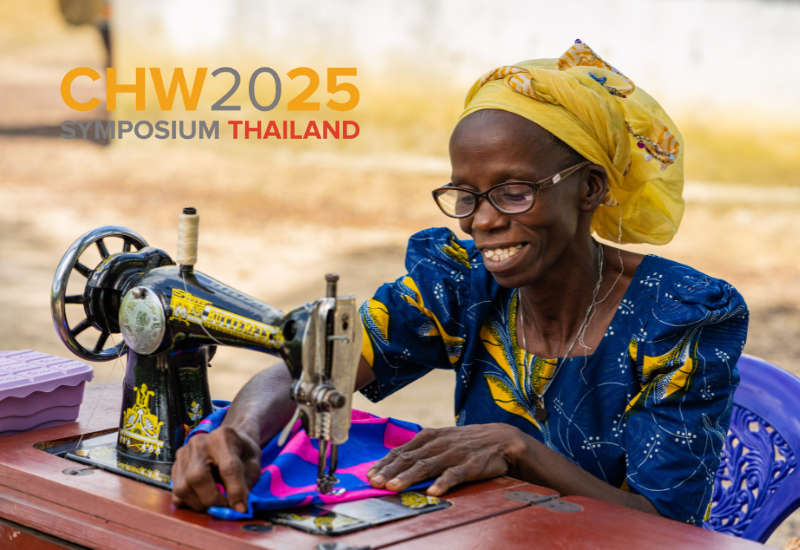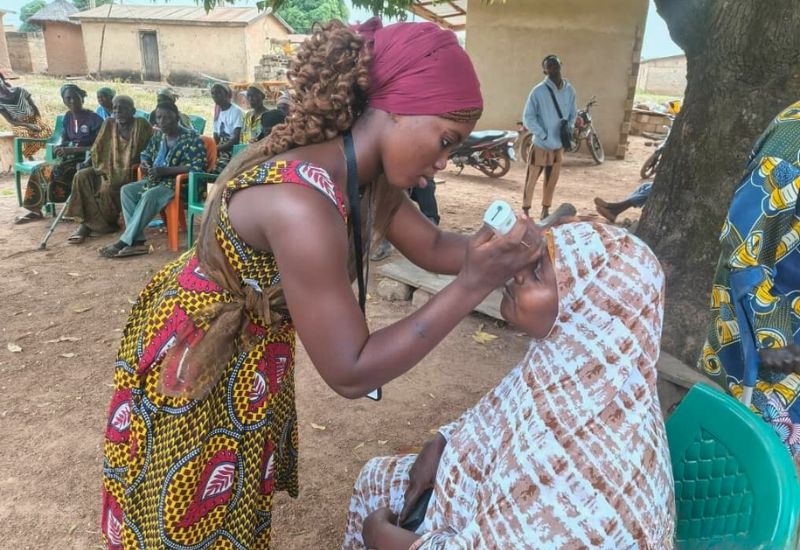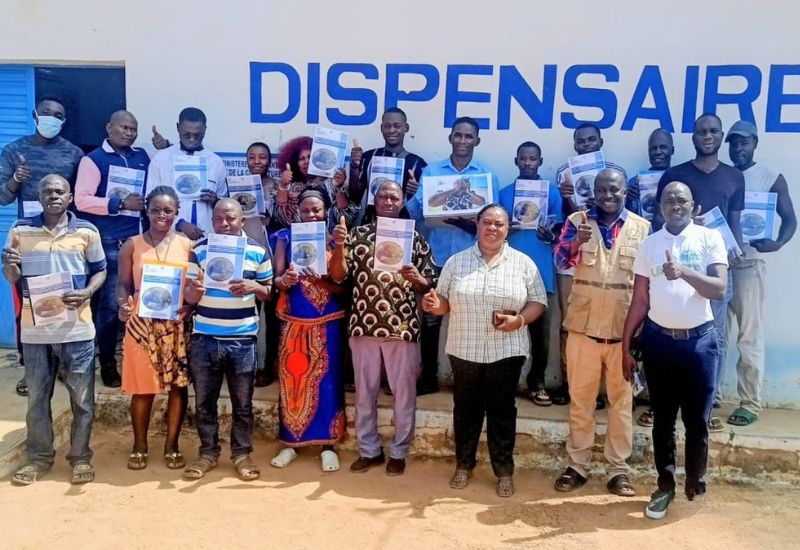Outside of Nigeria and South Africa, Africa has, on average, only 1 optometrist per 500,000 inhabitants. The need to increase the number of eye health specialists is urgent. But there are passionate opticians, optometrists and ophthalmologists working to advance eye health and increase access to the millions of children and adults who live and learn in Africa.
Dr. John Chiemerie Douglas is one of them.
Dr. Douglas is an optometrist hailing from Nigeria. He has a wealth of experience, and is currently making a positive impact in Liberia through his role is the school eye health program, supported by EYElliance.
Dr. Douglas is based at Liberia Eye Center (and 1 day a week at Waterfield Eye Center in Margibi County). In addition to his regular facility-level patient care responsibilities, Dr. Douglas also represents L.V. Prasad Eye Institute (LVPEI), one of the Ministry of Education's implementation partners in Liberia, in all aspects of school eye health planning, coordination, training, data collection, screening and glasses provision. Along with his colleagues, and other LVPEI optometric technicians, he regularly travels to schools to conduct comprehensive eye exams, including more advanced screening, refraction, eyeglasses and/or referrals to students identified by teachers. EYElliance has regular touch points with Dr. Douglas and works closely with him on all aspects of coordination, planning and implementation of the government-led school eye health program in Liberia.

Dr. Douglas' work is not just about eye exams; it's about bringing hope and transformation to the lives of school children and teachers in Liberia. We recently sat down with him and asked him to share more about this day-to-day work.
Walk us through how you conduct eye exams in schools.
In his engaging and personable style, Dr. Douglas takes us through the process of conducting eye exams in schools. He initiates the eye exam by establishing rapport: introducing himself to the student and explaining the upcoming procedure. He guides the student through visual acuity tests, either with letter charts or Tumbling E charts, assessing monocular vision by calling letters or determining the direction of the Tumbling E. He explains, "I only refract students with spherical equivalence."
When conducting visiting schools, Dr. Douglas also dilates the eyes to access the internal part of the eye, and provides anti-allergic eye drops or antibiotic eyedrops when needed.
“In our work, we only make use of equipment that is suited to school eye health programs.” explains Dr. Douglas. This equipment is easy to transport, affordable, and effective in rural and remote regions where they don't always have access to electricity or a clinical working environment. “We use 6 and 3 meter Snellen and Tumbling E charts, near vision task charts, trial lens boxes, torch lights, handheld occluders, retinoscope, and ophthalmoscope.”
Community activation and participation play a large role in the success of the program. “Prior to these visits to schools, communication is sent to inform the parents, guardians, community leaders and other stakeholders emphasizing the importance of parental consent that allows all children to attend school and participate.” emphasizes Dr. Douglas.
What does the referral process look like in your work?
Dr. Douglas’ services go beyond eye exams, including educating students about eye health, providing corrective eyeglasses, readers for teachers, and making referrals to secondary and tertiary health centers when needed.
Dr. Douglas says that the most common eye condition he encounters is his work is vernal keratoconjunctivitis (VKC), more commonly known as allergies of the eye, and uncorrected refractive error which requires prescription eyeglasses.
When it comes to referrals, he navigates a clear referral path from teachers to school visits, then to secondary or tertiary centers for further investigation and surgical treatments. Dr. Douglas ensures no one gets left behind by being available to answer questions and providing follow-up support. “To prevent people from getting lost in the system, I follow up to see what could be the limitations why the referred students didn't come to the referral center.”
What role do you play in inventory management and training in eye health programs in Liberia?
Dr. Douglas plays a pivotal advisory role in inventory management, ensuring efficient inventory systems for both school and community eye health programs in Liberia. He shares an anecdote, "When we received the first shipment of eyeglasses for the community eye health program I had to count every single item in various cartons. After that, I remember giving a recommendation that items of the same kind should be packed in one carton for ease of access, and this was adopted and became helpful."
Training is a key aspect of Dr. Douglas’ work. He provides training to District Education Officers and District Health Officers, who later go on to train teachers in their districts on screening students in individual schools. He shares, “School eye health has been adopted into the school curriculum. During registration of students in a new academic calendar, every students will have their eyes screened by teachers in the various schools.” Ongoing training ensures that eye health remains an integral part of the school curriculum.

What impact is school eye health having in Liberia?
Reflecting on the impact of school eye health, Dr. Douglas states, "The school eye health program in Liberia has brought relief to both parents and students. Parents who were unaware that the poor performance of their child was as a result of uncorrected refracted error now see a great difference in their school work after the child received eyeglasses. Students who shy away from academic exercise due to ocular abnormalities, can now join cheerfully after undergoing treatment like surgeries."
Dr. Douglas shares two heart-warming anecdotes from the recent school eye health program in Salayea District, Lofa County, Liberia. “A girl who had a congenital cataract extraction without an optical correction has suffered poor vision for more than 5 years. After being given - 5.00 DSph optical eyeglass, the immediate joy on her face and shouts of excitement could resurrect the dead!”
He goes on to explain how the school eye health program is bringing hope to teachers and educators as well as school children “In one of my school visits I conducted a vision screening on a teacher who is short-sighted (with entry VA of 20/200), but because of financial constraints has never consulted with any ophthalmic center. Through the school eye health program, we were able to get him the glasses he needed. And when he received his - 3.00 DSph eyeglasses, he could see from 20/200 to 20/25.”
We at EYElliance could not do the work we do without committed eye specialists like Dr Douglas. We are grateful for the passion and expertise of these visionaries that are bring clear vision to thousands of students across Liberia, and beyond.
To learn more about school eye health in Liberia read: Testing Four Adaptations for Sustainable School Eye Health in Liberia.
And find out more about how EYElliance is creating universal access to school eye health at Envisioning a World Where All School Children Have equitable Access to Eyeglasses.







.jpg)